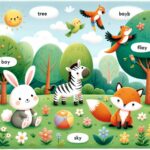Exploring early literacy activities for pre-verbal toddlers is akin to unlocking a hidden treasure chest filled with the wonders of words and imagination. At this pivotal development stage, engaging toddlers in activities that promote literacy can significantly impact their language acquisition, cognitive development, and future reading skills.
The Magic of Reading Aloud to Pre-verbal Toddlers
Reading aloud is a cornerstone early literacy activity for pre-verbal toddlers. This simple yet powerful activity lays the groundwork for language learning, enabling toddlers to absorb the rhythms, tones, and sounds of spoken language. A study from the American Academy of Pediatrics highlights reading aloud as an essential component of language development, underscoring its role in building language comprehension and vocabulary.
By incorporating books with colorful illustrations and engaging narratives, parents can captivate their toddler’s attention and stimulate their imagination. For example, picture books that depict everyday scenarios or fantastical worlds introduce toddlers to new vocabulary and concepts, paving the way for meaningful language acquisition. (American Academy of Pediatrics)
Early Literacy Activities for Pre-verbal Toddlers
Engaging in early literacy activities for pre-verbal toddlers is not only about reading. It encompasses a broad range of interactive and sensory-rich experiences designed to foster language development and early literacy skills. Here are some activities to integrate into your daily routine:
- Introduce sign language to enhance communication. Sign language can bridge the gap between pre-verbal stages and verbal communication, enriching your toddler’s ability to express themselves. (Learn more about introducing sign language)
- Make use of storytime to build a reading routine, establishing a special time for stories enhances bonding and introduces the concept of narratives. (Discover tips for building a reading routine)
- Engage in sensory play with textured books or homemade sensory boards. Sensory experiences support cognitive development and can introduce new vocabulary. (Understand the role of sensory play)
These activities not only entertain but also educate, creating a joyful learning environment that nurtures early literacy skills in pre-verbal toddlers.
Crafting a Nurturing Literacy Environment at Home
Creating a literacy-rich environment at home is crucial for fostering early literacy activities for pre-verbal toddlers. This involves more than having a selection of books; it’s about integrating literacy into all aspects of your home and daily routines.
Designate a cozy reading nook with comfortable seating and accessible bookshelves stocked with a variety of age-appropriate books. Engaging with books daily sets a foundation for a lifelong love of reading. Additionally, label objects around your home with their names to introduce written words in a meaningful context, and encourage storytelling by using family photos or creating simple picture books together.
Remember, early literacy is not about teaching toddlers to read, but rather about laying the groundwork for language development and a love for reading. By incorporating early literacy activities for pre-verbal toddlers into your daily routine, you’re not only enhancing their development but also deepening your bond and creating cherished memories.













